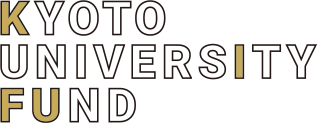Vol.19 Three-person Discussion
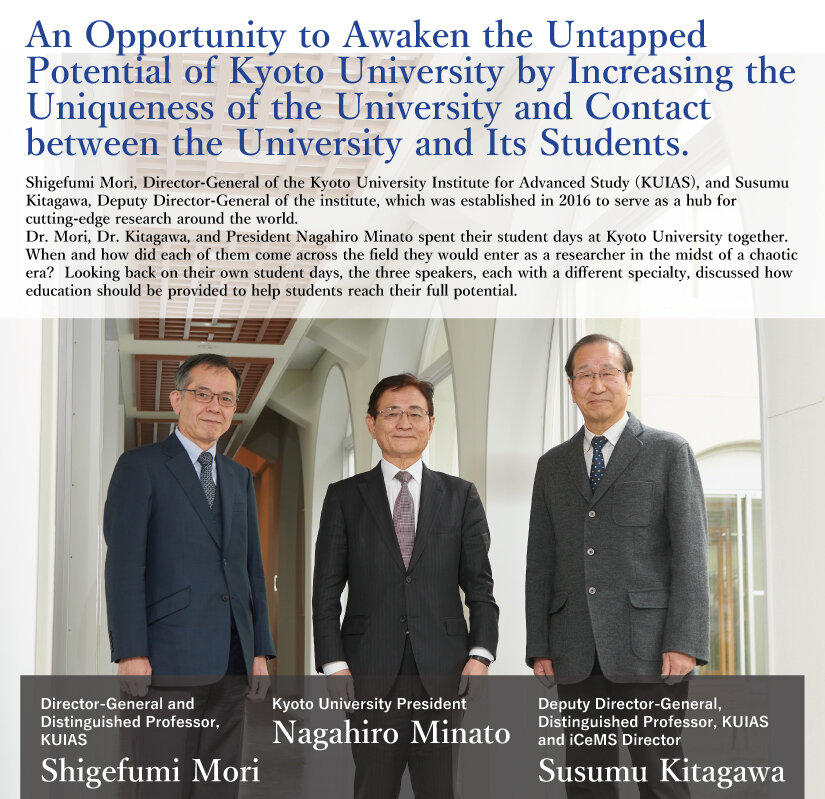
Shigefumi Mori
Graduated from the Faculty of Science, Kyoto University, in 1973, and completed a master's program at the Graduate School of Science, Kyoto University, in 1975. Doctor of Science (Kyoto University). Served as a research associate in the Faculty of Science at Kyoto University, a lecturer, assistant professor, and professor in the School of Science at Nagoya University, and a professor and director at the Research Institute for Mathematical Sciences (RIMS), Kyoto University. Assumed current position in 2016.
Awarded the Fields Medal, the Nobel Prize in mathematics, in 1990 for his "Proof of the Existence of Minimal Models in Three-dimensional Algebraic Varieties." Received the Cole Prize from the American Mathematical Society in the same year. Person of Cultural Merit. Became a member of the Japan Academy in 1998. Served as the President of the International Mathematical Union from 2015 to 2018.
Nagahiro Minato
Graduated from the Faculty of Medicine, Kyoto University, in 1975. Doctor of Medicine (Kyoto University). Served as a researcher at Albert Einstein College of Medicine in the United States, an assistant professor at Jichi Medical University, and a professor at the Graduate School of Medicine of Kyoto University. Became the Dean of the Graduate School of Medicine and the Dean of the Faculty of Medicine at Kyoto University in 2010, Executive Vice-President and Vice-President of Kyoto University in 2014, and the Provost of Kyoto University in 2017. Assumed current position in 2020.
Received the 2014 JCA-CHAAO Award (Japanese Cancer Association) and the 2016 PSJ Award for Drug Research and Development (The Pharmaceutical Society of Japan).
Discovered PD-1, a membrane protein that acts as a brake for immune responses. Known for his joint research with Distinguished Professor Tasuku Honjo, who was awarded the Nobel Prize in Physiology or Medicine in 2018.
Susumu Kitagawa
Graduated from the Department of Fuel Chemistry, Faculty of Engineering, Kyoto University, in 1974, completed a master's program at the Graduate School of Engineering, Kyoto University, in 1976, and completed a doctoral program at the Graduate School of Engineering, Kyoto University, in 1979. Doctor of Engineering (Kyoto University).
Served as an assistant professor at the Faculty of Science and Engineering of Kindai University, a professor at the Faculty of Science at Tokyo Metropolitan University, and a professor at the Graduate School of Engineering at Kyoto University. Became the director of the iCeMS in 2013. Became a distinguished professor at the Kyoto University Institute for Advanced Study (KUIAS) in 2017. Assumed current position in 2020.
Received the Thomson Reuters Citation Laureates in 2010. Received the Japan Academy Prize in 2016. Received the Chemistry for the Future Solvay Prize in 2017. Became a member of the Japan Academy in 2019.
Developed a porous material that has many nano-sized holes. The porous material is expected to be used for the development of new materials that adsorb carbon dioxide, which causes global warming, and for medical applications.
Student days at Kyoto University spent together
Each person's encounter with basic science
Minato Dr. Mori and I entered Kyoto University in 1969, and Dr. Kitagawa in 1970. Although you are of the same generation, you have worked in different fields, such as mathematics, medicine, and chemistry. How did each of you become interested in these fields? Dr. Mori, have you been good at mathematics since you were a child?
Mori When I was in elementary school, I was sent to a cram school because my parents were busy with our family business, but I was never good at any subject and never ranked high in test scores. But one day, my teacher showed me a Swiss roll cake and said, "If you can solve this math problem, there will be a reward." I could not resist, so I tried to solve it, and I was the only one who got it right. This was the first time I thought, "I might be good at math." However, my grades did not suddenly improve after that.
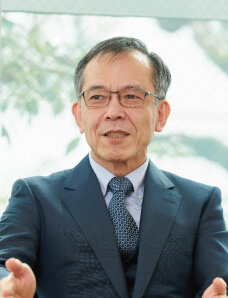
Minato When did your math test scores begin to improve?
Mori They began to improve after I entered high school. Everyone has their own period of growth, but in my case, I do not know what triggered my growth. I just knew that I wanted to study math. I chose Kyoto University because the University of Tokyo's entrance examination was cancelled, but in the end, I guess Kyoto and I had good chemistry. I was comfortable with the close proximity between research and life.
Minato There were not many students in the Faculty of Science who wanted to study mathematics, but did you have any doubts?
Mori I had no doubts at all because I was no good at anything except math. It was around the time I entered my master's program that I began to have doubts. Math is a subject where you can work hard but not get good results. If it is an experiment, even if you fail, something will be left behind or you will get a clue. However, mathematics is a discipline in which you think in your own mind, so while the advantage is that you can do it anywhere, the difficulty is that if you fail, nothing is left behind. So I had a hard time making the transition from student to researcher.
Minato It's a special world, isn't it? When did you first become interested in chemistry, Dr. Kitagawa?
Kitagawa I always liked physics, and the Faculty of Science was my first choice, but at the time, during the period of rapid economic growth, "engineering" was one of the keywords. I entered the Faculty of Engineering because my cousin who attended the Undergraduate School of Chemical Science and Technology, Faculty of Engineering, Kyoto University, told me that the Faculty of Engineering was interesting. But when I finally entered the University, I found that Kyoto University was full of students with problematic behaviors.
Minato In our year, the entrance ceremony was cancelled and the University was on lockdown.
Mori There were no classes for the first six months of school.
Kitagawa I also learned from my seniors how to escape from collisions. I lost sight of my goal as soon as I entered the school, and although I studied foreign languages for the time being, examinations were postponed and I lost motivation again. I felt like I was in limbo, but I was fortunate to have Professor Kenichi Fukui as a member of my department.
Minato He was still active back then.
Kitagawa Yes. I thought quantum chemistry, which was Professor Fukui's specialty, sounded interesting, and that is how I became interested in chemistry. Thanks to this, I was able to carefully study physics and mathematics, which are the basis of quantum chemistry, during my freshman and sophomore years. In my senior year, I belonged to the laboratory of Professor Teijiro Yonezawa, who was a student of Professor Kenichi Fukui.
The general perception of engineering is that conducts applied research for manufacturing, but the chemistry department at Kyoto University's Faculty of Engineering was different. People at Kyoto University's Faculty of Engineering do what they think is fun, without thinking about how it will benefit the world. In a way, it was probably the department that most embodies the uniqueness of Kyoto University. However, although the professors seemed to be doing only what they liked, they were systematizing their studies and creating their own academic flow, and I thought that this was what academia was all about.
Minato Both of you found a good fit with basic science early on in your careers. In my case, I was interested in geology and the origin of life, but I did not know what field to enter. My teacher suggested that I should go to medical school, so I enrolled, but with medicine being a step-by-step discipline, I did not really fit in. When I was thinking I wanted to conduct more experiments, I came across immunology. I did not attend lectures or practical training, but read books in their original language, visited various laboratories, participated in conferences, and wrote papers. There was no one around me doing research on immunity, so I wrote a letter to a researcher in the U.S. Luckily, I was contacted by the professor, and at the age of 26, I went to study abroad and led a fulfilling life as a researcher. Unlike the two of you, it took me a bit of time to figure out my aptitude.
Kyoto University students are blessed
with access to renowned professors
Minato At that time, Kyoto University had an aspect of "anything goes," didn't it?
Mori Our entrance year was special. There were many students who were stuck in their senior year because the division into different departments was no longer in place from their junior year. I think that "anything goes" has both good and bad sides to it.
Minato I see. In addition, there was a side of Kyoto University that did not do much in the way of hand-holding and coaching to pull everyone up.
Kitagawa Regarding education, the stance of Kyoto University was to demonstrate how it is done and expect everyone to grow on their own. The teachers seemed to have an atmosphere that was not overbearing and not like they were ordering students what to do. However, whether one succeeds depends on the willingness of the student. It was possible to "do things halfhearted," but that was one of the values, and in some cases, people who did things halfhearted later rose to the top. I think the important thing is to accept diversity and not to destroy your own potential when you are in the middle of your growth in college. Currently, the field of education has become too uniform.
Until now, Japanese people have been able to live in their own culture, but as globalization progresses, this type of education will no longer be possible.
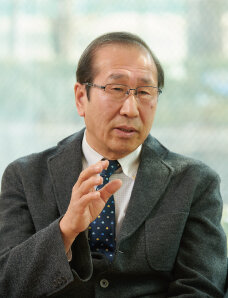
Minato Especially at overseas universities, the standard of education is well established. Compared to us, who only knew about research, I was surprised to see that students overseas knew a lot about things other than research, such as university administration and systems.
Kitagawa Back in our days, if you studied according to the undergraduate curriculum, you could acquire broad and basic knowledge, which was also applicable to overseas universities. Undergraduate education was well organized, but graduate schools left everything up to students.
Minato Maybe you are right. I guess there are advantages and disadvantages to both Japanese and American educational methods.
By the way, when we were students, Kyoto University had highly respected professors in both medicine and mathematics, including Professor Fukui in engineering. We were very fortunate that these teachers were not people living in another world, but were accessible to students.
Kitagawa I agree. When I was a graduate student, Professor Fukui's laboratory was nearby, and when he was in his office, I nervously visited him and asked him some questions. Professor Fukui listened intently and thought hard before giving me advice. I remember being very impressed by his attitude.
Mori When I was a junior, Professor Heisuke Hironaka, who won the Fields Medal, came to Japan to give an intensive lecture at the Research Institute for Mathematical Sciences (RIMS). One day, I saw him in the cafeteria and nervously asked him about a question that I did not understand, and he drew me a diagram without hesitation. As soon as I saw the diagram, I knew the answer to the question. It was a very memorable event.
Research experience outside of Kyoto University
increases your tolerance level
Minato What the three of us have in common is that we conducted research at universities in Japan and abroad other than Kyoto University when we were young. Do you feel that this experience has had an impact on your career?
Kitagawa I experienced working at three different universities, both public and private, and belonged to the Faculty of Engineering and the Faculty of Science, and I learned about all the differences, including management policies. I think the biggest benefit I gained from this experience is that my tolerance level has increased. When people have been in the same environment for a long time, they tend to have difficulty accepting unconventional ways of doing things and resist those who try to change their ways, but I have come to believe that we should calmly listen to different kinds of opinions and let the organization run smoothly by accepting what is good.
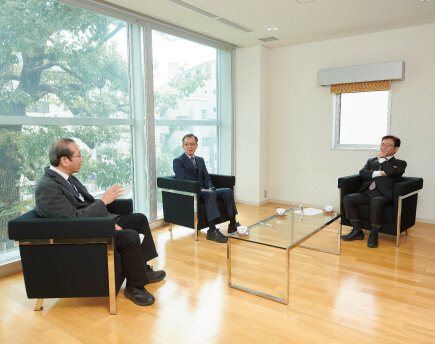
Minato There will always be people who say, "This is the way it has to be," but we need to have greater tolerance and flexibility in order to achieve "better."
Mori In my second year as a research associate, I traveled to Harvard University as an assistant professor. My business trip was in 1977, one year before I received my degree. I had already submitted my dissertation and had completed all but the paperwork, so they accepted me.
Minato That is the same year I went to the U.S., but you went early.
Mori My mentor, Dr. Masayoshi Nagata, was thinking of having me receive my degree one year earlier and then travel abroad.
What I thought was good in the U.S. was that everyone balanced their studies and private life. Everyone concentrated hard during their class period, but when classes were over, there was no one remaining on campus. So, during the summer vacation of my second year, in an empty laboratory, I suddenly remembered I had a question unsolved, which I had been working on in Japan, and worked on it again. I was able to solve the question. It was a very difficult question that led to winning the Fields Medal. Maybe I was able to solve the question thanks to the change in environment and the good balance.
Minato I think the change in location brings a big difference. A change of location even changes a person's character. I used to not like Kyoto, where the distinction between public and private life is blurred and human relations are casual. In Tokyo, public life and private life were clearly separated, and relationships were formal, which I thought was a good thing, but as I got older, these aspects of Tokyo became less interesting. I came back to Kyoto University when I was 41 years old, and as Dr. Mori said, I now think that I like this feeling of Kyoto, where the workplace and home are not clearly separated but mixed up.
Mori Kyoto is full of places where you can take a short walk when you get tired of research.
When I was a research associate, I wanted to start a new research project, and I came across a paper that caught my attention. The lecturer who was doing the research lived nearby, so I brazenly visited the lecturer. The content we discussed became a co-authored paper, thanks to Kyoto's culture.
Kitagawa Kyoto is certainly an optimal environment for research, but universities in the Tokyo metropolitan area are close to the government and do a lot of work for academic societies, so it is easy to develop a sense of leadership and being at the top. Advocacy and leadership are important in creating academia, and I think that kind of education comes naturally in the Tokyo metropolitan area. It is a dilemma, though, because when you are in your late 30s to 50 years old, which is the most productive period for research, you have to take up a managerial position in an academic society, which takes away your time to think carefully.
I think I was fortunate as a researcher to come back to Kyoto after experiencing in my younger years an environment that allowed me to develop a perspective unrelated to research.
Young researchers inspire students
Bringing students and faculty closer together
Minato Based on your own experience, do you have any advice on what one should do during one's days as a student?
Mori Students should go abroad early in their student life, and the University should provide students with such opportunities.
Minato Students should study abroad not for a short term, but they should spend a certain amount of time abroad doing research, right?
Mori Students should study aboard for at least one year. I studied at Harvard University for three years and gained a lot of confidence.
Kitagawa When I was working at Kindai University, I went to Texas A&M University for a year and a half. The professor who presided over my laboratory at that time was an expert in inorganic chemistry, but he was not interested in any applications and pursued his own interests to the utmost. This experience helped me realize that the mindset of researchers often found among researchers at Kyoto University was actually international.
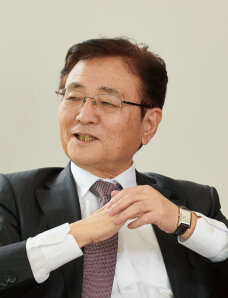
Minato We all have our own epoch-making moments when we realize our potential. There are times when one is not sure of something but suddenly awakens after encountering something. I think it is necessary to be exposed to a diverse world in order not to miss such an opportunity for awakening.
It is true that we have gained something from Kyoto University's culture of "anything goes," and in order to create a free environment similar to that, since I took office as president, we have started discussing a review of liberal arts education. Liberal arts education is overloaded, and even though it is important for science students to learn humanities fields, it is meaningless if they are forced to do so. In addition to increasing the degree of freedom, we should package subjects in such a way that it is easy to form an idea of what you should study if you are interested in a certain field. In addition, students should be able to freely access lectures and teachers they are interested in. We would like to make the content worth the time and make it a liberal arts education that will awaken students.
Kitagawa There are now about 10,000 related papers per year in the trendy fields, but it is meaningless to polish your search skills and read only new papers and learn only new theories. As long as you learn the basics of the background and acquire the necessary skills, you will be able to acquire the knowledge you need by yourself. I think it is important to learn about systematized studies and their beauty, not fragments.
Mori We held voluntary seminars for the first six months of our enrollment because there were no classes. I asked my homeroom teacher, who specialized in mathematics, to be our tutor, and doing so turned out to be a really good idea.
Minato We also held voluntary seminars and asked the school for credit for them.
Mori Even now, the problem with mathematics is that the connection between high school and university is not good, but in my case, my voluntary seminar really helped. In the end, there is nothing more rewarding than learning on your own.
Kitagawa I believe what is important is contact between students and young researchers. The Institute for Integrated Cell-Material Sciences (iCeMS) was established in 2007 as a World Premier International Research Center (WPI). As a non-educational institution, it does not hold lectures, but it does cooperate with the ILAS seminar, a small-group seminar for freshman undergraduates. When young researchers talk about their research in a happy and lively way, students listen intently with shining eyes. No matter how ingenious we are in our liberal arts education, there is nothing better than contact with researchers, and the role of inspiring students should be played by young researchers.
Minato I agree. The important thing is to motivate students, but right now there are too few opportunities for interaction between students and teachers outside of lectures. Students should not end up not having the opportunity to find the potential that they have, which could have blossomed if they had met someone. We must create opportunities for students to be exposed to the uniqueness of Kyoto University, which is full of interesting research and interesting human resources.
I would like to make the Kyoto University Institute for Advanced Study (KUIAS) a hub for young people across disciplines, and I look forward to your continued support. Thank you very much for your time today.
(Held in February 2021)

